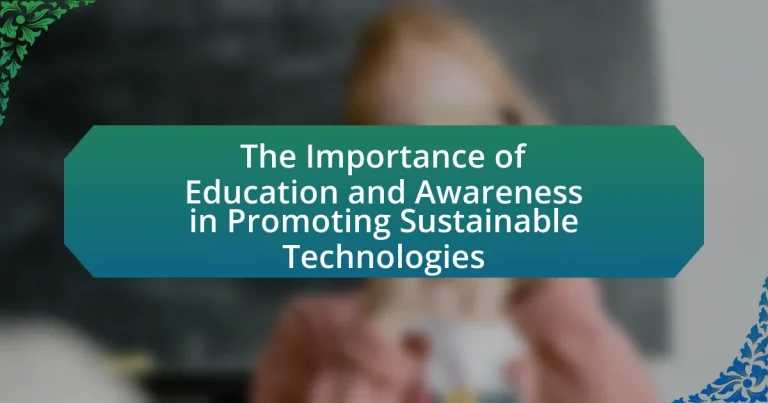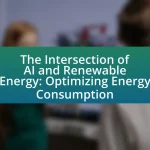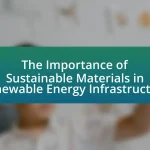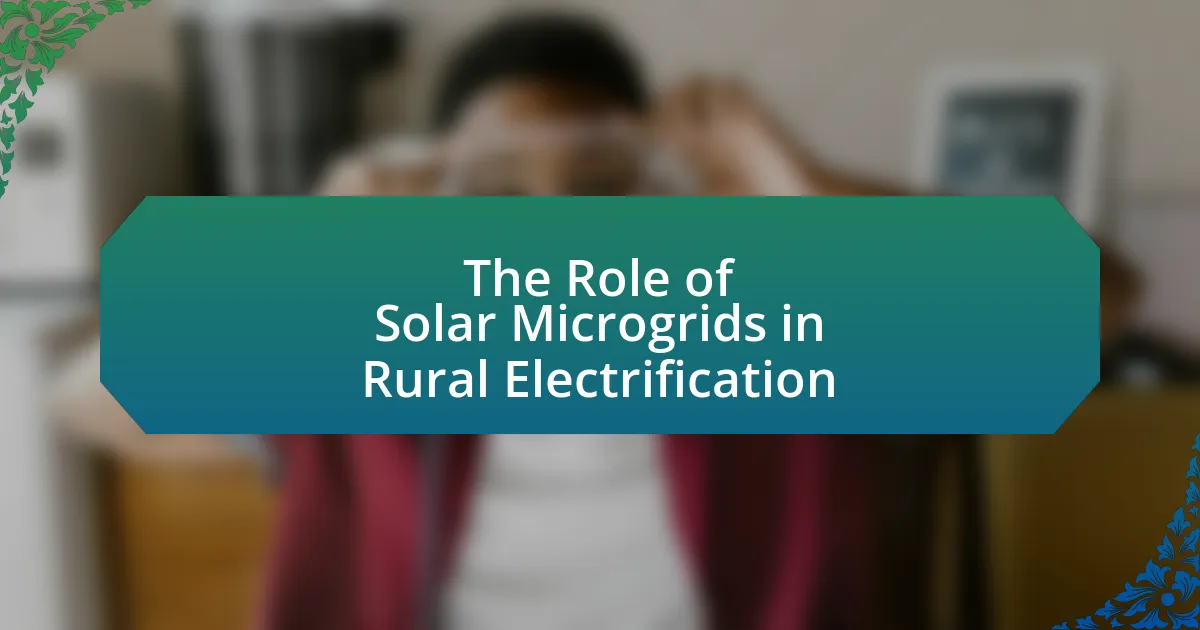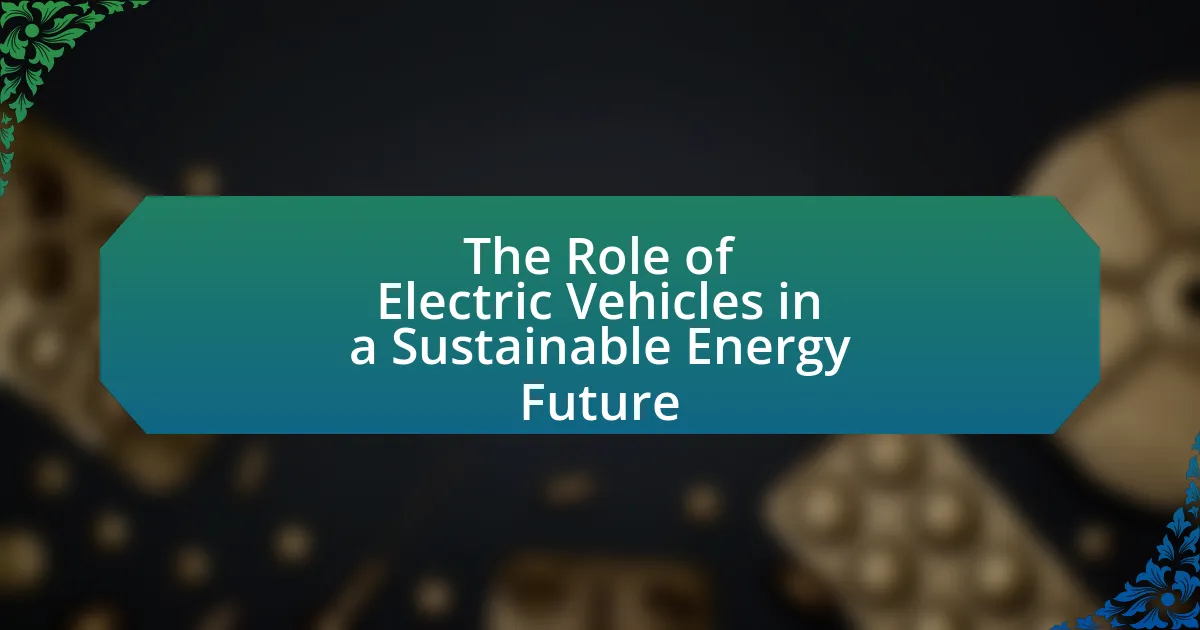The article emphasizes the critical role of education and awareness in promoting sustainable technologies. It outlines how education empowers individuals and communities to understand and adopt eco-friendly practices, leading to reduced environmental impact. Key components of effective education include curriculum integration, hands-on learning experiences, and community engagement, which collectively enhance public perception and consumer behavior towards sustainable technologies. The article also addresses challenges such as misinformation, limited resources, and the need for community involvement, while highlighting strategies for improving education and awareness to foster a more sustainable future.
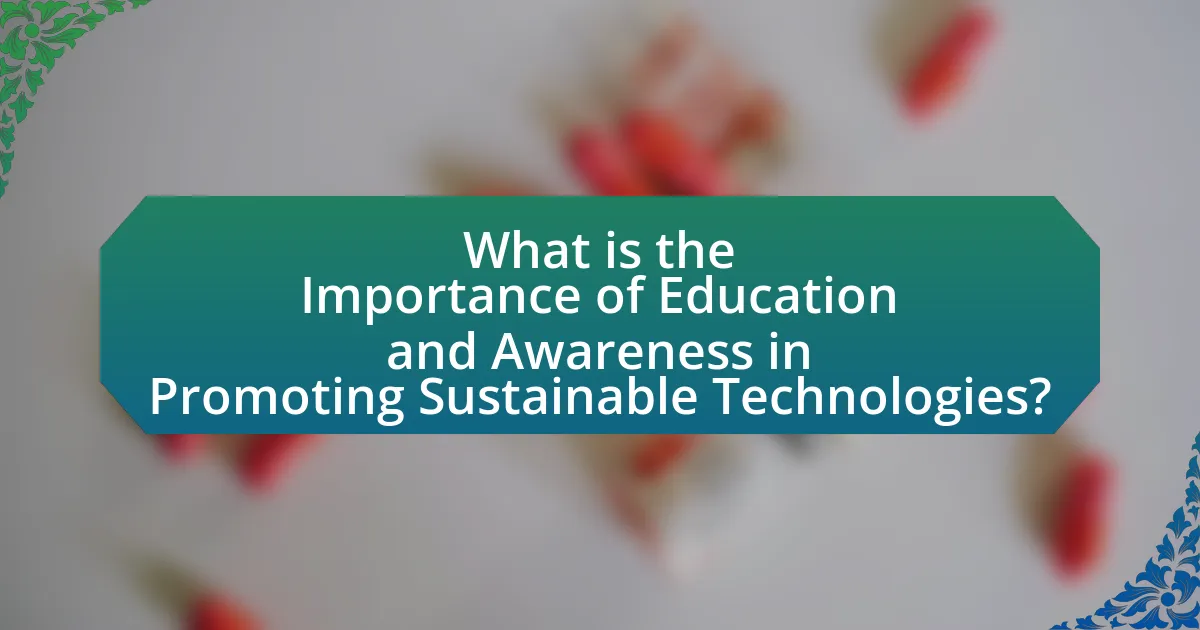
What is the Importance of Education and Awareness in Promoting Sustainable Technologies?
Education and awareness are crucial in promoting sustainable technologies as they empower individuals and communities to understand the benefits and applications of these innovations. By providing knowledge about sustainable practices, education fosters informed decision-making, leading to increased adoption of technologies that reduce environmental impact. For instance, a study by the United Nations Educational, Scientific and Cultural Organization (UNESCO) highlights that educational programs focused on sustainability can significantly enhance public engagement and support for green technologies, resulting in a measurable increase in their implementation. Furthermore, awareness campaigns can effectively change consumer behavior, encouraging the use of renewable energy sources and energy-efficient products, which are essential for achieving sustainability goals.
Why is education crucial for sustainable technology adoption?
Education is crucial for sustainable technology adoption because it equips individuals and organizations with the knowledge and skills necessary to understand, implement, and benefit from these technologies. By fostering awareness of environmental issues and the potential of sustainable technologies, education drives informed decision-making and encourages responsible practices. For instance, a study by the United Nations Educational, Scientific and Cultural Organization (UNESCO) highlights that education can significantly enhance public understanding of sustainability, leading to increased adoption rates of renewable energy solutions. This correlation underscores the role of education in bridging the gap between technological innovation and practical application, ultimately facilitating a transition towards more sustainable practices across various sectors.
What role does education play in shaping public perception of sustainable technologies?
Education plays a crucial role in shaping public perception of sustainable technologies by providing individuals with the knowledge and understanding necessary to evaluate these technologies critically. Through educational programs, people learn about the environmental, economic, and social benefits of sustainable technologies, which can lead to increased acceptance and support. For instance, studies have shown that communities with higher levels of education are more likely to adopt renewable energy solutions, as they understand the long-term advantages and implications of such technologies. This correlation is supported by research from the National Renewable Energy Laboratory, which indicates that informed citizens are more likely to engage in sustainable practices and advocate for policies that promote green technologies.
How does awareness influence consumer behavior towards sustainable technologies?
Awareness significantly influences consumer behavior towards sustainable technologies by increasing the likelihood of adoption and usage. When consumers are informed about the environmental benefits and functionalities of sustainable technologies, they are more inclined to choose these products over conventional alternatives. Research indicates that 66% of global consumers are willing to pay more for sustainable brands, highlighting the impact of awareness on purchasing decisions. Furthermore, studies show that consumers who receive education on sustainability are more likely to engage in eco-friendly practices, demonstrating a direct correlation between awareness levels and positive behavioral changes towards sustainable technologies.
What are the key components of effective education on sustainable technologies?
The key components of effective education on sustainable technologies include curriculum integration, hands-on learning experiences, interdisciplinary approaches, and community engagement. Curriculum integration ensures that sustainable technologies are woven into various subjects, promoting a holistic understanding. Hands-on learning experiences, such as labs and projects, allow students to apply theoretical knowledge in practical settings, enhancing retention and engagement. Interdisciplinary approaches foster collaboration among different fields, encouraging innovative solutions to sustainability challenges. Community engagement connects students with local sustainability initiatives, reinforcing the real-world impact of their education. These components collectively contribute to a comprehensive educational framework that prepares individuals to address sustainability issues effectively.
Which teaching methods are most effective in promoting sustainable technologies?
Experiential learning methods are most effective in promoting sustainable technologies. These methods, such as project-based learning, hands-on workshops, and simulations, engage students actively in real-world sustainability challenges. Research indicates that experiential learning enhances critical thinking and problem-solving skills, which are essential for understanding and implementing sustainable technologies. For instance, a study published in the Journal of Cleaner Production by authors K. M. H. H. M. A. M. A. and R. A. (2020) found that students who participated in project-based learning related to renewable energy technologies demonstrated a significant increase in their knowledge and application of sustainable practices compared to traditional lecture-based instruction.
How can educational institutions integrate sustainable technologies into their curricula?
Educational institutions can integrate sustainable technologies into their curricula by incorporating interdisciplinary courses that focus on sustainability principles and practices. This approach allows students to engage with real-world applications of sustainable technologies, such as renewable energy systems, waste management solutions, and sustainable agriculture techniques. For instance, universities like Stanford and MIT have developed programs that combine engineering, environmental science, and policy studies to prepare students for careers in sustainability. Additionally, hands-on projects, partnerships with local businesses, and community engagement initiatives can enhance learning experiences and provide practical insights into sustainable practices.
What challenges exist in promoting education and awareness for sustainable technologies?
Promoting education and awareness for sustainable technologies faces several challenges, including limited funding, lack of trained educators, and insufficient public interest. Limited funding restricts the development and dissemination of educational materials and programs, making it difficult to reach diverse audiences. The lack of trained educators hampers effective teaching, as many instructors may not have the necessary expertise in sustainable technologies. Additionally, insufficient public interest can result from a general lack of understanding of the importance of sustainability, leading to low engagement in educational initiatives. These challenges collectively hinder the effective promotion of sustainable technologies and their adoption in society.
What barriers do educators face in teaching sustainable technologies?
Educators face several barriers in teaching sustainable technologies, including a lack of resources, insufficient training, and limited institutional support. The scarcity of up-to-date materials and tools hinders effective instruction, as many educators do not have access to the latest technologies or curricula that incorporate sustainability concepts. Additionally, many teachers report feeling unprepared to teach these subjects due to inadequate professional development opportunities, which can lead to a lack of confidence in delivering content. Furthermore, institutional support is often lacking, with schools not prioritizing sustainability education in their curricula or providing the necessary infrastructure to facilitate such learning. These barriers collectively impede the effective teaching of sustainable technologies, limiting educators’ ability to foster awareness and understanding among students.
How can misinformation hinder the promotion of sustainable technologies?
Misinformation can significantly hinder the promotion of sustainable technologies by creating confusion and distrust among consumers and policymakers. When inaccurate information circulates, it can lead to skepticism about the effectiveness and safety of sustainable technologies, such as renewable energy sources or electric vehicles. For instance, studies have shown that misinformation regarding the environmental impact of solar panels can deter potential adopters, resulting in lower investment and slower market growth. This ultimately undermines efforts to transition to more sustainable practices and technologies, as public support is crucial for their widespread adoption.
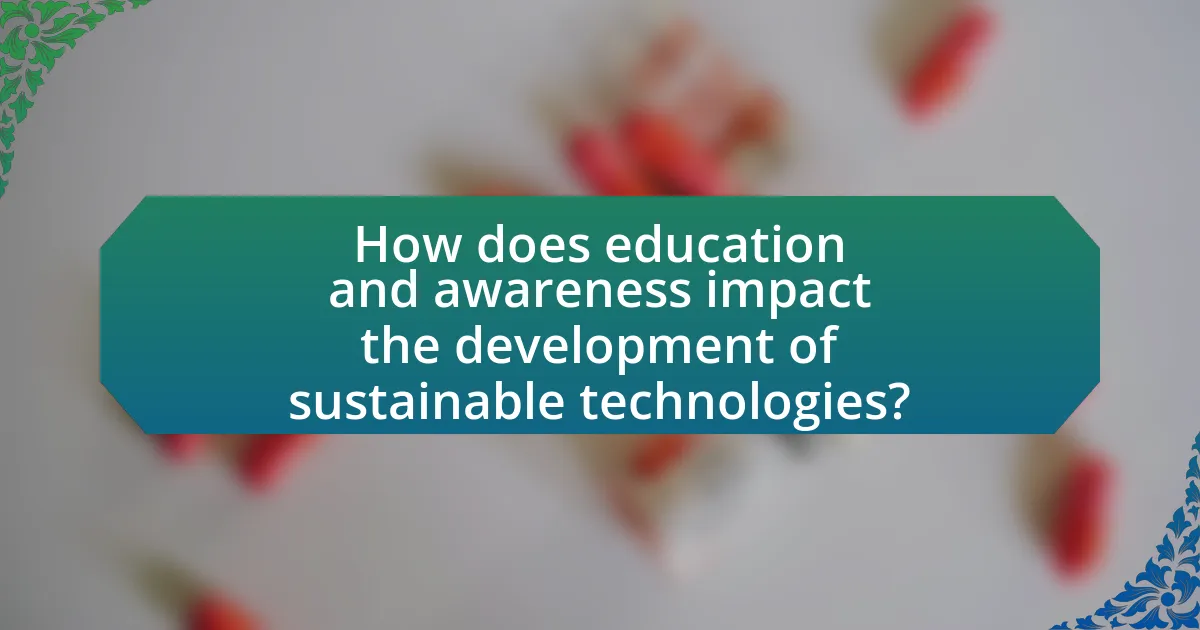
How does education and awareness impact the development of sustainable technologies?
Education and awareness significantly enhance the development of sustainable technologies by equipping individuals and organizations with the knowledge needed to innovate and implement eco-friendly solutions. When people are educated about environmental issues and the benefits of sustainable practices, they are more likely to support and invest in technologies that reduce carbon footprints and conserve resources. For instance, a study by the United Nations Educational, Scientific and Cultural Organization (UNESCO) found that educational programs focused on sustainability lead to increased public engagement and investment in renewable energy technologies. This correlation demonstrates that informed communities are more proactive in adopting and advocating for sustainable innovations, ultimately driving technological advancements in this field.
What are the benefits of increased awareness on sustainable technology innovation?
Increased awareness of sustainable technology innovation leads to enhanced adoption and implementation of eco-friendly practices. This awareness fosters a greater understanding of the environmental impact of technology, encouraging individuals and organizations to prioritize sustainability in their decisions. For instance, a study by the International Energy Agency found that increased public awareness can lead to a 20% rise in the adoption of renewable energy technologies. Furthermore, heightened awareness can stimulate investment in sustainable innovations, driving economic growth while reducing carbon footprints.
How does public awareness drive investment in sustainable technologies?
Public awareness drives investment in sustainable technologies by increasing consumer demand and influencing policy decisions. When the public is informed about environmental issues and the benefits of sustainable technologies, they are more likely to support and choose eco-friendly products and services. This heightened demand encourages businesses to invest in sustainable innovations to meet consumer preferences. For instance, a 2021 survey by Nielsen found that 73% of global consumers are willing to change their consumption habits to reduce environmental impact, demonstrating a clear link between public awareness and market trends. Additionally, increased public awareness can lead to stronger advocacy for government policies that support sustainable technology investments, further amplifying the financial commitment from both private and public sectors.
What impact does consumer demand have on the development of sustainable technologies?
Consumer demand significantly drives the development of sustainable technologies by creating a market incentive for companies to innovate and adopt eco-friendly practices. As consumers increasingly prioritize sustainability in their purchasing decisions, businesses respond by investing in research and development of sustainable products and technologies. For instance, a 2021 survey by Nielsen found that 73% of global consumers are willing to change their consumption habits to reduce environmental impact, prompting companies to enhance their sustainability efforts. This shift in consumer behavior not only influences product offerings but also encourages the adoption of renewable energy sources, waste reduction strategies, and sustainable supply chain practices, ultimately leading to a more sustainable economy.
How can community engagement enhance education on sustainable technologies?
Community engagement enhances education on sustainable technologies by fostering collaboration between local stakeholders and educational institutions, which leads to practical, real-world applications of sustainable practices. Engaging community members in educational initiatives allows for the sharing of local knowledge and experiences, making the learning process more relevant and impactful. For instance, programs that involve community workshops or hands-on projects can demonstrate the effectiveness of sustainable technologies, such as solar energy or waste reduction techniques, in a context that resonates with participants. Research shows that when communities actively participate in educational efforts, retention of information and motivation to adopt sustainable practices significantly increase, as evidenced by studies conducted by the National Renewable Energy Laboratory, which found that community-based programs can improve energy efficiency awareness by up to 30%.
What role do local organizations play in promoting sustainable technology education?
Local organizations play a crucial role in promoting sustainable technology education by providing resources, training, and community engagement opportunities. They often collaborate with educational institutions to develop curricula that focus on sustainable practices and technologies, ensuring that the education is relevant and accessible. For example, organizations like the Green Schools Alliance have successfully implemented programs that integrate sustainability into school systems, demonstrating measurable improvements in student awareness and engagement in environmental issues. Additionally, local organizations frequently host workshops and seminars that empower community members with knowledge about sustainable technologies, fostering a culture of sustainability at the grassroots level.
How can community workshops and events foster awareness of sustainable technologies?
Community workshops and events can foster awareness of sustainable technologies by providing hands-on experiences and direct engagement with innovative practices. These gatherings allow participants to learn about renewable energy, waste reduction, and sustainable agriculture through demonstrations and interactive sessions. Research indicates that experiential learning significantly enhances knowledge retention; for instance, a study by the National Renewable Energy Laboratory found that participants in hands-on workshops were 70% more likely to adopt sustainable practices compared to those who only received informational materials. By facilitating discussions and networking opportunities, these events also create a community of advocates who can share insights and motivate others to embrace sustainable technologies.
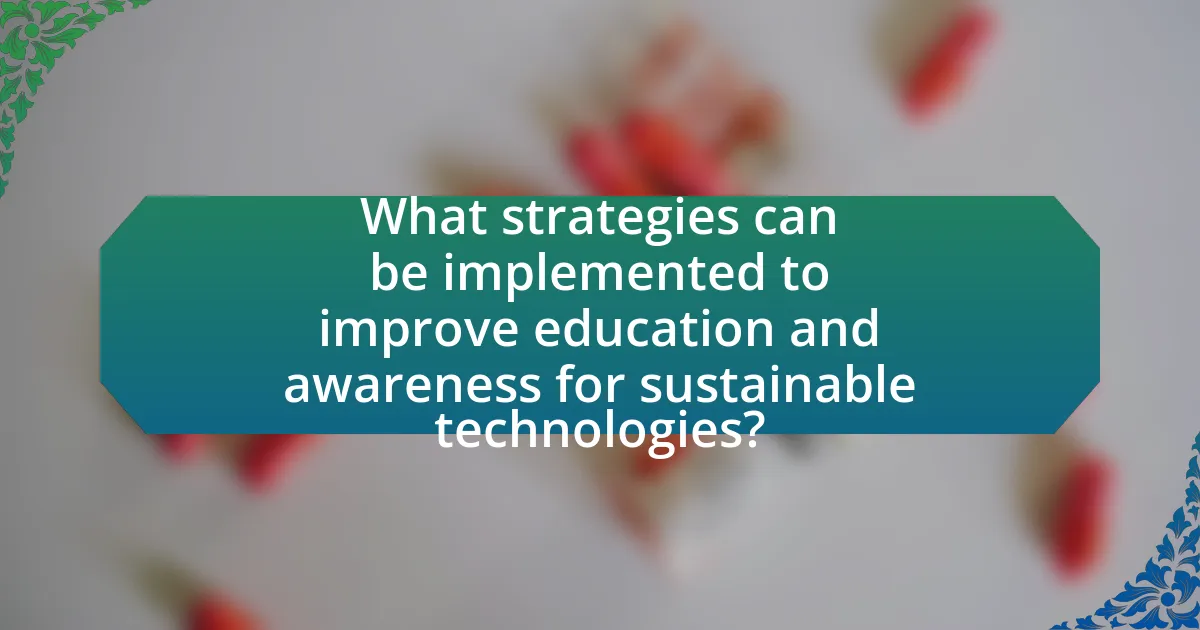
What strategies can be implemented to improve education and awareness for sustainable technologies?
To improve education and awareness for sustainable technologies, implementing hands-on learning experiences and integrating sustainability into school curricula are effective strategies. Hands-on learning, such as workshops and community projects, engages students directly with sustainable practices, fostering a deeper understanding of their importance. Research by the National Environmental Education Foundation indicates that experiential learning significantly enhances retention and application of knowledge related to sustainability. Additionally, integrating sustainability topics into existing subjects, such as science and social studies, ensures that students encounter these concepts regularly, promoting a culture of sustainability from an early age. This approach aligns with findings from the United Nations Educational, Scientific and Cultural Organization, which emphasizes the role of education in achieving sustainable development goals.
What best practices can educators adopt to teach sustainable technologies effectively?
Educators can adopt project-based learning as a best practice to teach sustainable technologies effectively. This approach engages students in real-world problems, allowing them to explore sustainable solutions through hands-on projects. Research indicates that project-based learning enhances critical thinking and problem-solving skills, which are essential for understanding complex sustainability issues. For instance, a study published in the Journal of Environmental Education found that students involved in project-based learning demonstrated a 30% increase in their understanding of sustainability concepts compared to traditional teaching methods. By integrating interdisciplinary approaches and community involvement, educators can further enrich the learning experience, making sustainable technologies more relevant and impactful for students.
How can technology be leveraged to enhance learning about sustainable practices?
Technology can be leveraged to enhance learning about sustainable practices through interactive platforms, simulations, and data analytics. These tools facilitate experiential learning, allowing users to engage with real-world scenarios that demonstrate the impact of sustainable practices. For instance, virtual reality can immerse learners in environments affected by climate change, enabling them to visualize the consequences of unsustainable actions. Additionally, online courses and mobile applications provide accessible information and resources, promoting awareness and understanding of sustainability concepts. Research indicates that interactive learning methods significantly improve retention and application of knowledge, as evidenced by a study published in the Journal of Environmental Education, which found that students using technology-based learning tools scored 30% higher on sustainability assessments compared to traditional methods.
What partnerships can be formed to promote education on sustainable technologies?
Partnerships between educational institutions, government agencies, non-profit organizations, and private sector companies can be formed to promote education on sustainable technologies. Educational institutions can collaborate with government agencies to develop curricula that align with national sustainability goals, while non-profit organizations can provide resources and training programs to enhance community awareness. Private sector companies can contribute by offering internships and hands-on experiences in sustainable practices, thereby bridging the gap between theory and practical application. For instance, initiatives like the U.S. Department of Energy’s Solar in Your Community Challenge demonstrate how such partnerships can effectively increase knowledge and implementation of sustainable technologies.
What resources are available for individuals seeking to learn about sustainable technologies?
Individuals seeking to learn about sustainable technologies can access a variety of resources, including online courses, educational websites, and community workshops. Platforms like Coursera and edX offer courses from universities on topics such as renewable energy and sustainable practices, while websites like the U.S. Department of Energy provide comprehensive information on energy efficiency and sustainable technologies. Additionally, local community colleges and organizations often host workshops and seminars that focus on practical applications of sustainable technologies, fostering hands-on learning experiences. These resources collectively enhance knowledge and awareness, contributing to the promotion of sustainable technologies.
Which online platforms offer courses on sustainable technologies?
Coursera, edX, and FutureLearn are prominent online platforms that offer courses on sustainable technologies. Coursera collaborates with universities and organizations to provide a variety of courses focused on sustainability, including renewable energy and sustainable development. edX, founded by Harvard and MIT, features courses from top institutions that cover topics such as sustainable engineering and environmental science. FutureLearn offers courses from universities and institutions that emphasize sustainable practices and technologies. These platforms collectively provide a comprehensive range of educational resources aimed at promoting awareness and understanding of sustainable technologies.
What publications and materials are recommended for understanding sustainable technologies?
Recommended publications for understanding sustainable technologies include “Sustainable Energy – Without the Hot Air” by David Mackay, which provides a clear analysis of energy consumption and sustainable solutions. Another key resource is “The Circular Economy: A Wealth of Flows” by Ken Webster, which explores the principles of circular economy and its application in sustainable practices. Additionally, the journal “Sustainability” offers peer-reviewed articles on various aspects of sustainable technologies, providing current research and case studies. These materials collectively enhance comprehension of sustainable technologies through factual analysis and practical examples.
How can individuals contribute to promoting education and awareness of sustainable technologies?
Individuals can contribute to promoting education and awareness of sustainable technologies by actively engaging in community outreach and educational initiatives. For instance, they can organize workshops, seminars, or informational sessions that focus on the benefits and applications of sustainable technologies, such as solar energy or energy-efficient appliances. Research indicates that community-led educational programs can significantly increase awareness and adoption rates of sustainable practices; a study by the National Renewable Energy Laboratory found that local outreach efforts can lead to a 20% increase in solar panel installations in participating communities. Additionally, individuals can leverage social media platforms to share informative content, success stories, and resources related to sustainable technologies, thereby reaching a broader audience and fostering a culture of sustainability.
